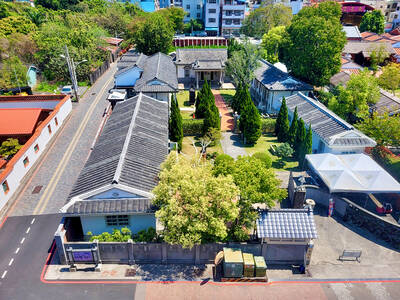Nearing the one-year anniversary of the release of its fifth album, Dark Is The Way, Light Is A Place, Christian rock five-piece Anberlin, which hails from the US, performs at The Wall (這牆) tomorrow.
“As cliche as it sounds, I believe love and music are international languages,” lead singer Stephen Christian said in an e-mail interview earlier this week. “I feel as though people of all ages, religions, backgrounds, etc., can relate with Anberlin even if they don’t share the same faith as me.”
The band is arriving in Taiwan fresh off tour dates in Japan, Thailand and China. How does the music translate? “In Japan, people sing along with every word of every song, but you could talk to them in between songs and they would have no clue what you were saying,” Christian said.

Photo Courtesy of Anberlin
Hard-working Anberlin is known for delivering energetic, passionate and sweaty performances. The band performs an average of 200 live shows per year. On track for achieving the same feat this year, the band has toured extensively throughout Asia and North America, with future dates set for Europe, South America and festivals in between. “I want to put in 100 percent every time I hit the stage. I may have to pay a price the 23 hours [we’re] off stage but it’s worth it,” Christian said.
The band, from central Florida, formed in 2002 and steadily grew a fan base with its catchy alt-rock and intelligent lyrics. The group’s fourth studio effort, New Surrender, saw the band reach new heights of popularity when the first single release, Feel Good Drag, became the No. 1 radio track on US Billboard’s Hot Modern Rock Tracks in 2009, and the 30th top track of the decade.
With the new album bringing Grammy-winning producer Brendan O’Brien (Pearl Jam, Bruce Springsteen) into the studio and into the fold, Anberlin’s popularity continues to grow.

April 28 to May 4 During the Japanese colonial era, a city’s “first” high school typically served Japanese students, while Taiwanese attended the “second” high school. Only in Taichung was this reversed. That’s because when Taichung First High School opened its doors on May 1, 1915 to serve Taiwanese students who were previously barred from secondary education, it was the only high school in town. Former principal Hideo Azukisawa threatened to quit when the government in 1922 attempted to transfer the “first” designation to a new local high school for Japanese students, leading to this unusual situation. Prior to the Taichung First

Chinese Nationalist Party (KMT) Chairman Eric Chu (朱立倫) hatched a bold plan to charge forward and seize the initiative when he held a protest in front of the Taipei City Prosecutors’ Office. Though risky, because illegal, its success would help tackle at least six problems facing both himself and the KMT. What he did not see coming was Taipei Mayor Chiang Wan-an (將萬安) tripping him up out of the gate. In spite of Chu being the most consequential and successful KMT chairman since the early 2010s — arguably saving the party from financial ruin and restoring its electoral viability —

The Ministry of Education last month proposed a nationwide ban on mobile devices in schools, aiming to curb concerns over student phone addiction. Under the revised regulation, which will take effect in August, teachers and schools will be required to collect mobile devices — including phones, laptops and wearables devices — for safekeeping during school hours, unless they are being used for educational purposes. For Chang Fong-ching (張鳳琴), the ban will have a positive impact. “It’s a good move,” says the professor in the department of

Toward the outside edge of Taichung City, in Wufeng District (霧峰去), sits a sprawling collection of single-story buildings with tiled roofs belonging to the Wufeng Lin (霧峰林家) family, who rose to prominence through success in military, commercial, and artistic endeavors in the 19th century. Most of these buildings have brick walls and tiled roofs in the traditional reddish-brown color, but in the middle is one incongruous property with bright white walls and a black tiled roof: Yipu Garden (頤圃). Purists may scoff at the Japanese-style exterior and its radical departure from the Fujianese architectural style of the surrounding buildings. However, the property